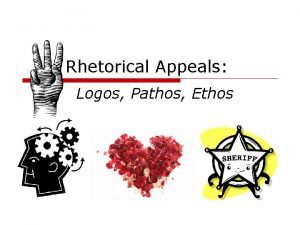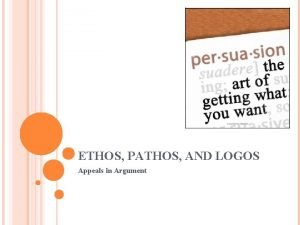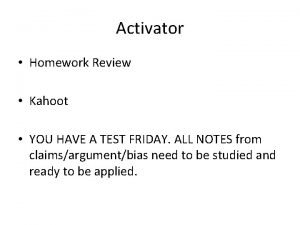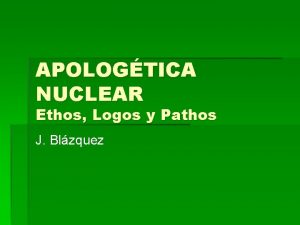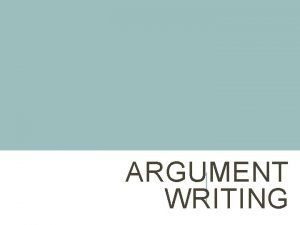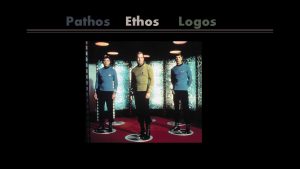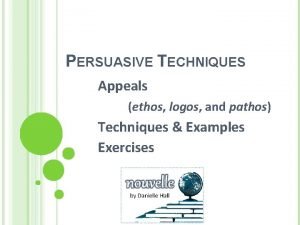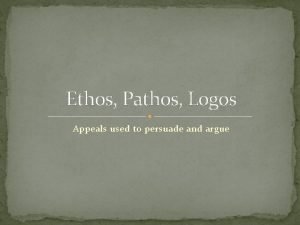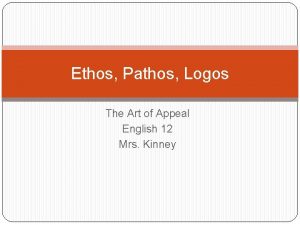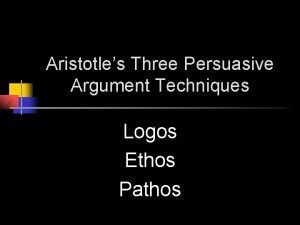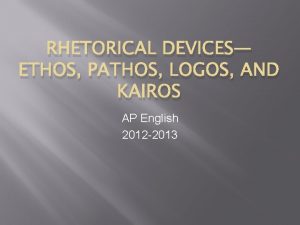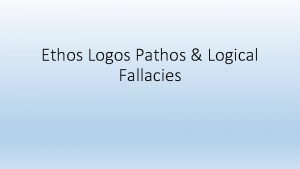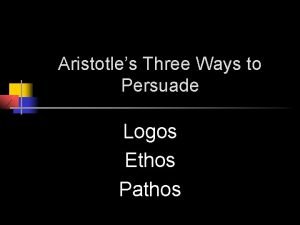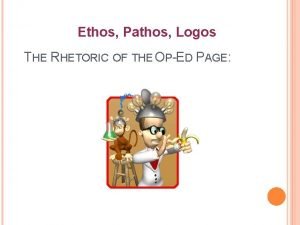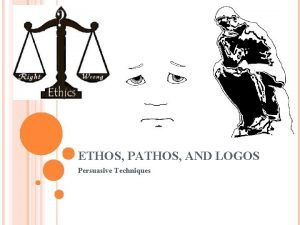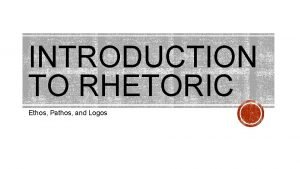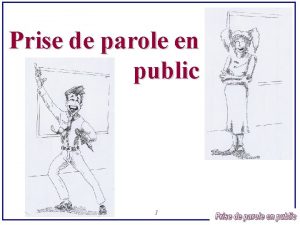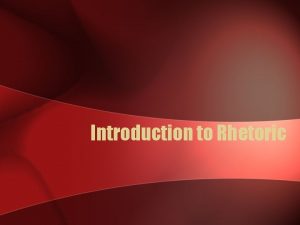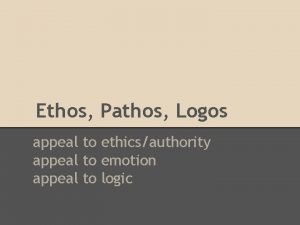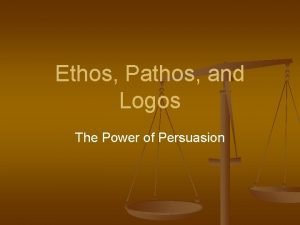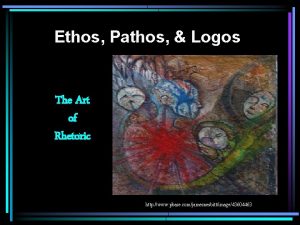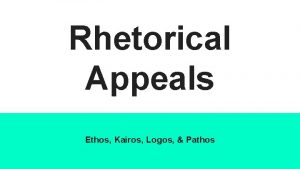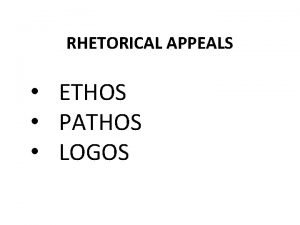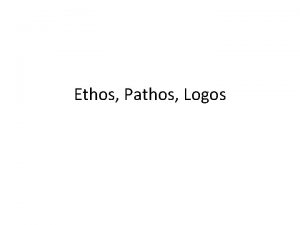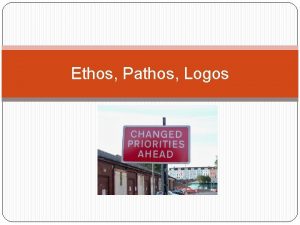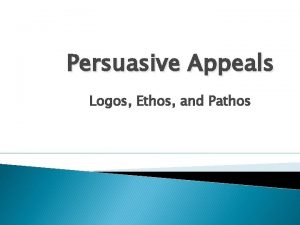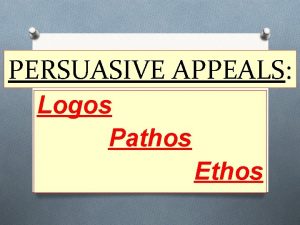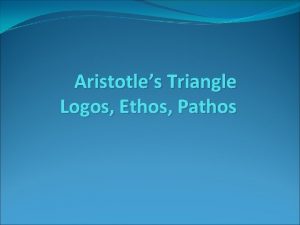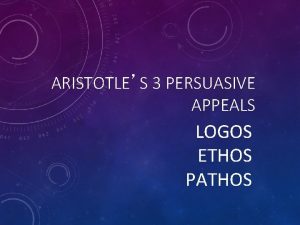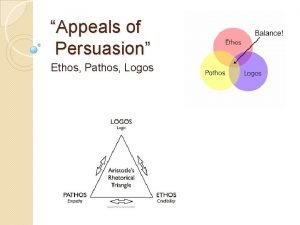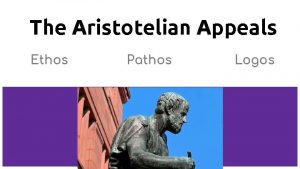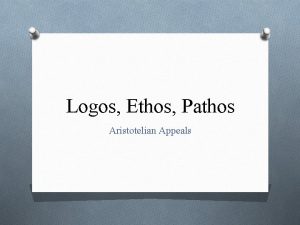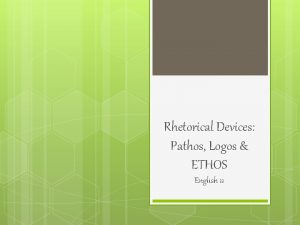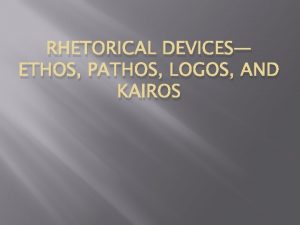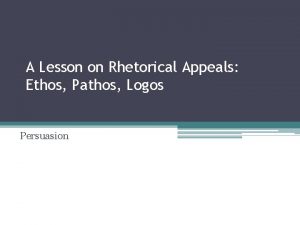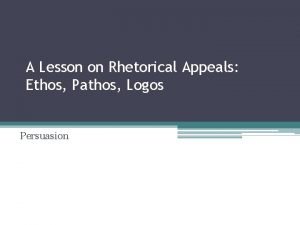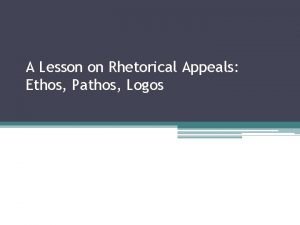Aristotles 3 Rhetorical Appeals Ethos Logos Pathos The









































- Slides: 41

Aristotle’s 3 Rhetorical Appeals Ethos, Logos, Pathos

The story of the light-switch

Aristotle’s 3 Rhetorical Appeals In a Nutshell

☺ Pathos = the appeal to emotion Example: “Mom, have I ever told you how beautiful you are? That thing that you’re doing to your hair adds a certain radiance to your already sublime smile. Moreover, you’re the best mom any kid could ever ask for. I’m truly fortunate to be blessed with such a great mother. By the way, can I borrow the car tonight? ”

☺ Pathos = the appeal to emotion Example: John Mc. Cain wanted to host a portion of the Republican Convention in front of Ground Zero.

☺ Pathos = the appeal to emotion Example: “As a concerned mother, I’m pleading with other mothers across the nation to forbid their children from watching the NBA. My god, do we want these ‘men’ to be role models for our children? Kobe Bryant brutally raped an innocent woman; Ron Artest and Steven Jackson beat up fans for throwing water at them; Damon Staudemire gets arrested every other week for drug possession; Latrell Sprewell strangled his coach simply because he disagreed with him. Mothers, is the type of man you want your boy to become? ”

☺ Pathos = the appeal to emotion Example: “Baby! What do you mean you want to break-up? Remember all the good times: our first kiss, that ‘magical’ walk in the woods, our prom night, Friday night movies. Are you really willing to throw it all away? Please baby, you’re my world; you’re my everything. ”

☺Ethos = the appeal to the credibility of the speaker or writer Example: “I feel confident that I will be an asset to your business if hired. I bring 16 years of automotive experience, an extensive background in foreign engine maintenance, and I also have specialized as a diagnostic technician for ten years. During these 16 years, I have only used one sick day. ”

☺Ethos = the appeal to the credibility of the speaker or writer Example: “Trust me, all men are lowdown scum. In each of my six marriages, the jerks either had short tempers or couldn’t keep their hands off the other ladies. ”

☺Ethos = the appeal to the credibility of the speaker or writer Example: “Americans prefer the taste of Pepsi to Coke. In a nationally conducted taste contest, blindfolded participants sampled the two products and eight out of ten people preferred the taste of Pepsi. ” Vs.

☺Ethos = the appeal to the credibility of the speaker or writer Example: “In 32 years I have owned several cars. I will never buy another American car because they’re garbage. Each Ford and Chrysler bit the dust within 17, 000 miles. On the other hand, I’ve owned 2 Toyotas and 3 Hondas and each has over 200, 000 miles on them and show no sign of quitting.

☺ Logos = the appeal to reason (“logic”) → The concept of Logos can best be understood if we introduce two new terms: premise and inference. The terms premise and inference are not as difficult as they may sound. The first refers to the point from which an argument begins, and the second refers to the process of arriving at the conclusion.

Premises When we reason, we start with some idea or fact or belief. That starting point is called a premise. A premise is the idea we don’t try to prove. We assume it is true. A premise is our reason for concluding something. When we reason, we combine two or more premises and draw a conclusion based on their connection:

Example: Premise 1: Arsenic can be deadly. Premise 2: My dog ate arsenic. Conclusion: It may die.

Example: Premise 1: Any thirty-five-year-old or older non-felon born in the US is eligible for the presidency. Premise 2: James is a thirty-eight-year-old non-felon born in the US. Conclusion: James is eligible for the presidency.

Not all premises are stated. Some may be implicit or hidden. Example: Premise: All living things require water. Conclusion: A cactus requires water. ►The unstated premise is “A cactus is a living thing. ”

Inferences The process of moving from the premises to the conclusion is called inference.

Example: Where there’s smoke there’s fire. Look over there - a cloud of smoke. There must be a fire.

When we analyze inferences, we are evaluating not the truth or adequacy of the premises but whether the reasoning from them to the conclusion is justified. When we make an inference, we consider the premises and then derive a conclusion that follows them.

The strength or weakness of an inference depends on the extent to which the premises compel us to the conclusion. In any argument, we need to evaluate how compelling those premises are.

How compelling are the premises and how strong are the inferences in the following examples?

□ I wrote her twelve letters but she never answered. She does not want to correspond with me. □ Although we have been in two classes together, David has never invited me to go mountain climbing. David must hate me.

Aristotelian Role Play

Directions: n It’s a Friday and Mr. Kuhn is at it again; he’s overloading his students with homework. Not only is your Poetic Seventh essay due next class, you have to read Wuthering Heights (a very fat book), write an allegorical analysis of Kafka’s Metamorphosis, and to top it all off you have to write a rhetorical analysis of some stupid Teletubby article. It’s too much!! n Count off by 3’s (Group 1 = Pathos Group 2 = Ethos Group 3 = Logos) n Each group will need to plead their case to Mr. Kuhn exclusively using their assigned rhetorical appeal. n All group members must speak

Sunday Comic Think-Pair-Square n n n At each square you will find a series of comics You need to analyze three (3) You may ask members of your square for assistance, but please use your own noodles and submit authentic work

Directions n n Analyze the language of the comic. What is really being said? Explain how the comic uses ethos, pathos, and logos


Standing before majestic snowcapped mountains, a pristine wilderness, President Bush makes the assertion – “I am the Environmental President. ” By the third strip we learn that the backdrop is a façade. The podium is husked away and the pulley system is at work dismantling the immaculate mountain scene to reveal towering smoke stacks. Black clouds of choking pollutants loom behind the President’s stage props and nullify the legitimacy of his claim.

The comic primarily calls into question and spoofs President Bush’s ethos (credibility). He addresses an audience and claims to have a genuine concern for the environment, but his remarks are a farce. A disconnect exists between the President’s words and his actions. The comic also uses pathos by making an emotional appeal to those who view the environment as an important public issue. It implores the reader to not take this administration’s words at face value, but to probe the empty rhetoric further. In brief, the emotional appeal resonates through the hypocrisy. And lastly, the comic’s logos notes the fallacy of the claim, “I am the Environmental President. ” The logic simply falls apart because the President apparently says one thing, and does another.

Taking a Closer Look

Taking a Closer Look

Taking a Closer Look

Taking a Closer Look

Taking a Closer Look


Duped by children’s characters





 What greek philosopher named the appeals ethos pathos logos
What greek philosopher named the appeals ethos pathos logos Appeals ethos pathos logos
Appeals ethos pathos logos Appeals ethos pathos logos
Appeals ethos pathos logos Logos ethos pathos triangle
Logos ethos pathos triangle Logos patos
Logos patos Whats an argumentative essay
Whats an argumentative essay Advertisements ethos pathos logos
Advertisements ethos pathos logos Kahoot persuasive techniques
Kahoot persuasive techniques Kairos logos pathos ethos
Kairos logos pathos ethos What is an ethos appeal
What is an ethos appeal Kairos pathos ethos logos
Kairos pathos ethos logos Ethos pathos logos
Ethos pathos logos Ethos pathos logos in fahrenheit 451
Ethos pathos logos in fahrenheit 451 Plato persuasive appeal
Plato persuasive appeal Ethos pathos logos assignment
Ethos pathos logos assignment Pathos
Pathos Shmoop ethos pathos logos
Shmoop ethos pathos logos Ethos, pathos logos worksheet doc
Ethos, pathos logos worksheet doc Ethos pathos logos poster
Ethos pathos logos poster We are marshall speech ethos pathos logos
We are marshall speech ethos pathos logos Logos ethos pathos
Logos ethos pathos Kairos ethos pathos logos
Kairos ethos pathos logos Ethos logos pathos quiz
Ethos logos pathos quiz Ethos pathos logos kairos
Ethos pathos logos kairos Logos example
Logos example Pathos ethos logos
Pathos ethos logos Ethos pathos logos packet
Ethos pathos logos packet Ethos pathos logos quiz
Ethos pathos logos quiz Logos examples
Logos examples Pathos ethos logos and kairos
Pathos ethos logos and kairos Ethos pathos logos
Ethos pathos logos Pathos rhetoric definition
Pathos rhetoric definition Ethos def
Ethos def Toni morrison letter to obama ethos pathos logos
Toni morrison letter to obama ethos pathos logos Ethos pathos logos
Ethos pathos logos Definition of persuasive speech
Definition of persuasive speech Diane boyd wildlife biologist act answers
Diane boyd wildlife biologist act answers Ethos pathos logos chart
Ethos pathos logos chart Ethos, pathos, logos
Ethos, pathos, logos Appelform logos
Appelform logos Rhetorical devices for logos
Rhetorical devices for logos Ethos pathos logos kairos
Ethos pathos logos kairos
